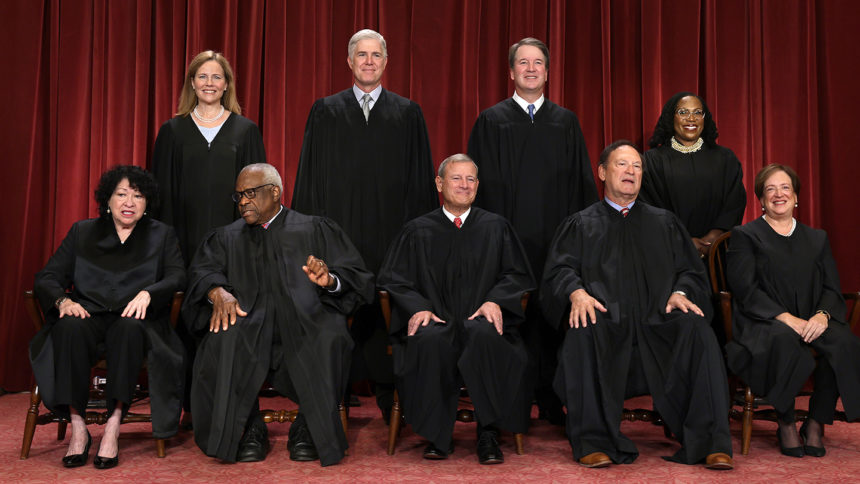
Is the system for oversight and discipline already in place for Medicaid-funded nursing homes enough to deliver satisfaction for aggrieved parties or should they be able to sue both public and private entities who deliver federally-funded benefits?
Tuesday’s oral arguments in Health and Hospital Corp. v. Talevski at the U.S. Supreme Court dealt with this central question that could have overarching effects on millions of people, far wider than the nursing homes sector. At risk are actions against entities that dish out such benefits as Supplemental Nutrition Assistance Program and Temporary Assistance for Needy Families.
At issue is a broad question of whether there is a private right of action for individuals to sue county and state entities who deliver federally funded benefits. A narrower question is whether there is a private right of action to sue county and state entities under the Nursing Home Reform Act of 1987.
The Talevski family sued the Health and Hospital Corporation for mistreatment of Gorgi Talevski. When HHC lost at the circuit court level — the 7th Circuit said Talevski did have a private right to sue — it petitioned the High Court.
What started as a nursing home case has expanded into whether individuals will be allowed to sue state or county entities who deliver any federal benefits such as Medicare, Medicaid, TANF, SNAP, etc.
The question at hand is, does federal statute Section 1983, which allows people to sue certain government entities and its employees for violations of their civil rights, apply to entities that already have government oversight and redress?
In this specific case, because Health and Human Services and the Centers for Medicare & Medicaid Services already have ways to investigate and take corrective action against nursing homes, the Court is deciding whether individuals should also be able to look to the courts for justice.
Politics in play?
The ultimate answer will be decided on conservative-liberal lines among the justices, believes Paul Garcia, a partner in the Regulatory Department of Hooper, Lundy & Bookman, who discussed the case McKnight’s Long-Term Care News Tuesday after oral arguments.
Some conservative-leaning justices seemed to focus on whether they should even be hearing the case since they think it had already been decided in previous case law (which the 7th Circuit referred to).
If Gorgi Talevski had been in a privately owned facility, this case would be largely unknown because the Talevskis would simply take action against a company. That company still accepts federal reimbursement but isn’t run by a government entity, and thus is not covered by 1983.
“It’s a very real possibility that the Supreme Court finds that there is not a private right of action under the Nursing Home Reform Act,” Garcia said. “The question is going to be whether they make that determination under existing case law or under some new standard. From oral arguments, that appears to be whether they take into consideration that the remedial system in place is one that deals with public or private entities.
“The tension will be whether they make that determination based on existing case law or they carve out something new where the NHRA was written mostly to regulate an industry owned by private entities. Was it sufficient for both private and public entities? We can see a scenario where the Supreme Court says you do not need to have the ability to sue the agency under 1983, that the existing framework is enough.”
‘Anyone’s guess’
Angela Rinehart, an associate with Stoll, Keenon, Ogden, called the future ruling “a bit of a wild card.”
“I think Justices Kagan, Sotomayor and Jackson are clearly with Talevski on the issue that section 1983 means what it says — that there is an express cause of action,” Rinehart told McKnight’s Tuesday. “Justices Roberts and Kavanaugh seem to be struggling with whether administrative remedies are different and whether administrative remedies preclude 1983 claims.”
Rinehart said the push and pull of oral arguments were highlighted by Kavanaugh asking what was wrong with the administrative system in place for redress and the Talevski counsel explaining that all the family had tried to do was to seek redress.
“In this case, they notably mentioned that they went to several medical malpractice attorneys and were turned away because the case wasn’t worth enough money in Indiana, which points exactly to the concern this case initially caused nursing homes in Indiana — that is, that plaintiffs would more often file 1983 claims instead of the negligence lawsuits we are used to seeing,” she said.
“I think it’s anyone’s guess what the majority will do on this case, but it is possible that the court buys the US’s position, finding that 1983 does create an express cause of action, but not here because the administrative remedies available in this case lay out the specific enforcement mechanism available.”
A ruling is expected before the end of the court’s current session in June.



